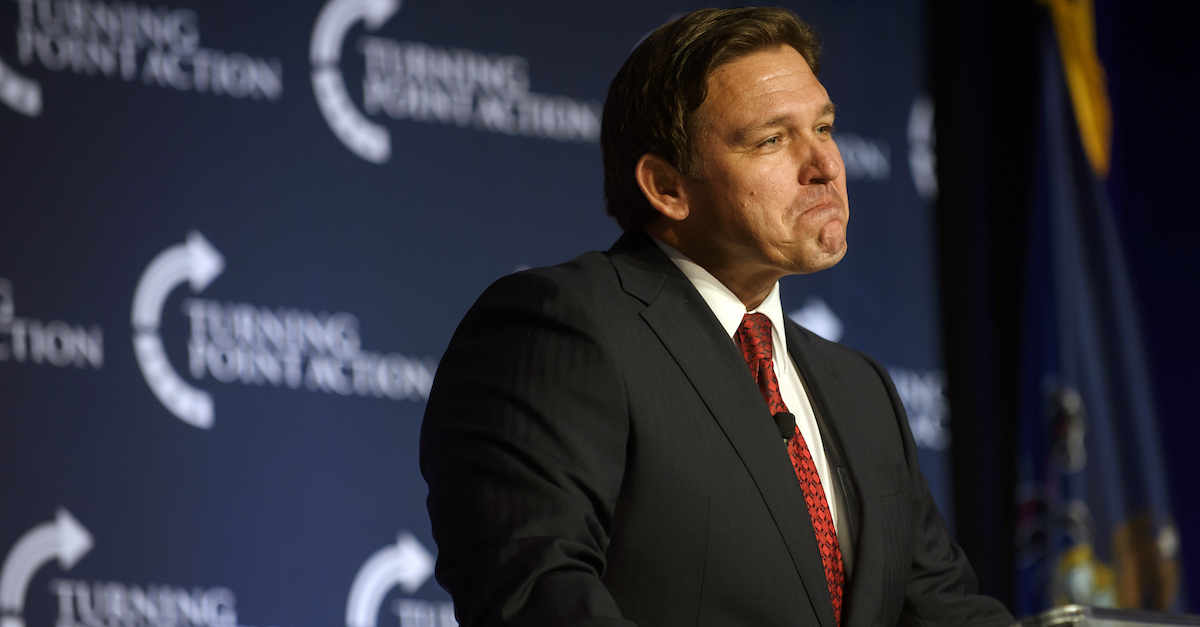
Florida Gov. Ron DeSantis (R) speaks at the ‘Unite and Win Rally” in support of Pennsylvania Republican gubernatorial candidate Doug Mastriano at the Wyndham Hotel on Aug. 19, 2022. (Photo by Jeff Swensen/Getty Images)
The Florida students and parents who sued the Sunshine State’s board of education over enforcement of Gov. Ron DeSantis’s “Don’t Say Gay” statute told a federal judge that they have endured “substantial, concrete and particularized harms” over the law.
In 63-page legal brief, their attorney Roberta Kaplan — known for frequently suing former President Donald Trump and his allies — said the harms to her clients include “censorship, self-censorship, discrimination, and denials of access to information and educational opportunities concerning LGBTQ people and issues.”
“We are hopeful that the Court will reject Defendants’ motion to dismiss this case and allow our clients to have their day in court,” Kaplan wrote in a statement.
In March, more than half a dozen students and parents filed a federal lawsuit days after DeSantis signed House Bill 1557, better known as the “Don’t Say Gay” law. The Florida governor styled it as a “Parental Rights in Education” statute.
The law forbids “classroom discussion about sexual orientation or gender identity in certain grade levels or in a specified manner,” and says that “[c]lassroom instruction by school personnel or third parties on sexual orientation or gender identity may not occur in kindergarten through grade 3 or in a manner that is not age appropriate or developmentally appropriate for students in accordance with state standards.”
The plaintiffs include Rabbi Amy Morrison and Dr. Cecile Houry, a lesbian couple with two children; Hatcher Powderly, a middle school teacher; and Zander Moricz, a gay high school senior at a magnet school.
They have sued the state’s board of education, its members, and other state and local education agencies, which are currently trying to dismiss the case. Though the plaintiffs originally sued DeSantis as well, they voluntarily dismissed those claims without prejudice to renew earlier this year.
In order to keep the remaining claims alive, the plaintiffs must persuade a federal judge that they have plausibly alleged that they have been harmed. They say that they have easily met that bar.
“In many cases, school officials explicitly have cited H.B. 1557 as the reason for their actions; in others, it is reasonable (indeed obvious) to infer as much,” their legal brief states. “And these instances of censorship and self-censorship have uniformly and uniquely affected LGBTQ issues and people; we are unaware of any circumstances where H.B. 1557 was invoked by a school district to change circumstances in a manner targeting straight or non-transgender people.”
According to the brief, Pasco County administrators ordered employees to remove safe space stickers for fear that “demonstrations of support and places of refuge for the LGBTQ community” would violate the law. In Manatee County, the Gay-Straight Alliance could not meet because no teacher would participate for the same reason, they say.
The legal brief abounds with further examples from Orange County, Broward County, and Miami-Dade County.
“Multiple school districts have also removed LGBTQ-related books (while not removing books that may be seen as instructing students on heterosexual relationships or ‘traditional’ families),” the legal brief states.
DeSantis claims that “Don’t Say Gay” is a misnomer, and critics have the law wrong. Florida schools take a similar position in court.
“In its litigation filings — though apparently nowhere else — the State takes the view that everyone in Florida has misunderstood H.B. 1557,” the plaintiffs’ brief states. “According to the State, H.B. 1557 is drawn narrowly, limited to the classroom, and aimed only at school boards.”
Calling that defense implausible, the plaintiffs note that penalties for violations of the “murky” can extend beyond the school boards to the teachers.
“These actions reinforce the basic point that everyone in Florida’s schools already understands: any speech or activity concerning LGBTQ people should be avoided upon pain of adverse consequences under H.B. 1557,” the brief states.
U.S. District Judge Allen C. Winsor, a Trump appointee, is presiding over the case.